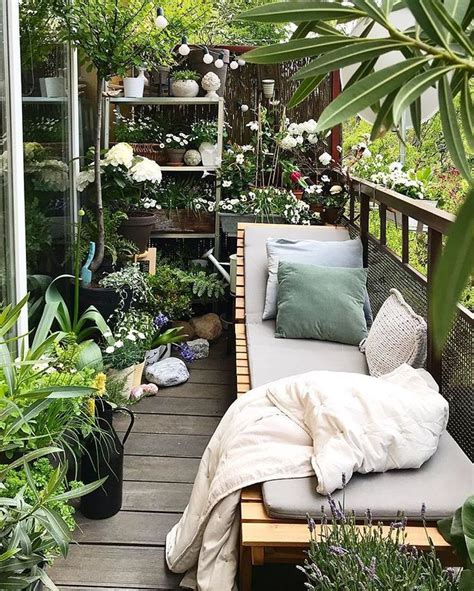Transforming Your Balcony into a Nature-Inspired Garden: Tips for Small Urban Spaces
In the fast-paced urban world, many crave a slice of nature within the limited confines of their home. Balcony gardening offers a simple and achievable way to create a nature-inspired garden, even in the smallest of urban spaces. With a little creativity, you can turn your balcony into a lush, green oasis that not only beautifies your home but also benefits your mental well-being. In this article, we will guide you through key concepts, practical applications, and strategies to create the perfect nature-inspired garden on your balcony.
Key Concepts for Nature-Inspired Balcony Gardening
- Container Gardening: Container gardening is essential for balcony gardens. Choose the right size, type, and material of containers to ensure plant health. Consider self-watering containers for easy maintenance.
- Plant Selection: Opt for native plants that thrive in small spaces. Native plants require less maintenance and water, making them perfect for urban gardening.
- Microclimate: Analyze the microclimate of your balcony, considering sun exposure, wind patterns, and humidity levels to choose suitable plants.
- Vertical Gardening: Maximize vertical space by incorporating trellises, hanging pots, and climbing plants to make the most of your limited space.
- Pollinator-Friendly Plants: Add plants that attract bees, butterflies, and birds to bring more wildlife to your balcony.
Historical Context of Balcony Gardening
Urban gardening, especially in small spaces like balconies, has its roots in ancient civilizations. The Hanging Gardens of Babylon were an early example of vertical gardening in confined spaces. In more modern times, window boxes and small balcony gardens became popular in densely populated European cities during the Industrial Revolution. Today, as urbanization continues, balcony gardening has surged in popularity as people seek to reconnect with nature despite space limitations.
Current State of Urban Gardening
Balcony gardening is growing rapidly in urban areas due to increasing environmental awareness, the rise of eco-conscious living, and the need for more green spaces in cities. With innovations in container gardening and a vast range of gardening tips available online, it has never been easier to start a nature-inspired garden on your balcony. Recent trends also focus on growing edible plants, such as herbs and vegetables, alongside decorative flora, making balcony gardens both beautiful and practical.
Practical Applications of Nature-Inspired Gardening on a Balcony
- Container and Pot Choices: Select containers that fit the scale of your space while complementing the overall garden design. Recycled materials can provide creative solutions for small space gardening.
- Layering Plants: Create visual interest by layering plants of different heights. For instance, tall plants can be placed at the back, mid-height plants in the center, and trailing plants at the front.
- Soil Quality: Good soil is critical in container gardening. Use high-quality potting mix, ensuring proper drainage to avoid root rot.
- Watering Techniques: Water conservation is key. Consider drip irrigation systems or self-watering containers to reduce water usage and effort.
- DIY Décor: Add a personal touch with handmade planters, upcycled garden furniture, and nature-inspired decor to complement your greenery.
Case Studies: Successful Nature-Inspired Balcony Gardens
| Location | Space Constraints | Plant Selections | Unique Features |
|---|---|---|---|
| New York City | 80 sq ft balcony | Native ferns, succulents, herbs | Vertical garden, self-watering pots |
| London | 50 sq ft balcony | Lavender, rosemary, ivy | Hanging baskets, recycled wooden planters |
| Tokyo | 30 sq ft balcony | Compact bonsai trees, moss | Zen-inspired garden, stone paths |
| Paris | 70 sq ft balcony | Geraniums, roses, herbs | Wrought-iron planters, trellises for climbing plants |
Stakeholder Analysis: Who Benefits from Balcony Gardens?
- Homeowners and Renters: A nature-inspired garden on the balcony provides an escape from the hustle of urban life, offering a peaceful retreat.
- Urban Communities: Green balconies can enhance the appearance of buildings, promoting environmental responsibility and fostering community connections.
- Environmental Advocates: Nature-inspired balcony gardens contribute to urban biodiversity and help reduce the urban heat island effect.
Implementation Guidelines for Balcony Gardens
- Space Assessment: Measure your balcony and take note of environmental factors such as sun exposure, wind, and shade. This will help in plant selection and design layout.
- Design Planning: Decide on a garden design that suits your lifestyle, whether it’s an herb garden, a flower garden, or a mixture of both. Consider adding seating for a more inviting space.
- Choose the Right Plants: Select plants that thrive in the conditions your balcony offers. Opt for native and drought-resistant plants for easier maintenance.
- Prepare Containers: Choose appropriate containers with good drainage. Add a layer of gravel at the bottom of each pot to ensure roots don’t get waterlogged.
- Maintain Your Garden: Regular pruning, watering, and feeding are crucial. Use organic fertilizers to keep your plants healthy.
Ethical Considerations in Balcony Gardening
When designing a nature-inspired garden, it’s essential to consider sustainability. Choose eco-friendly materials, avoid invasive species, and support local plant nurseries. Additionally, consider the environmental impact of your water usage and take steps to minimize it through efficient watering systems or rainwater harvesting.
Limitations and Future Research on Urban Balcony Gardening
Despite the growing popularity of balcony gardening, there are limitations to consider. Small spaces may restrict plant variety, and the weight of containers could pose structural challenges. Moreover, environmental conditions like pollution and lack of sunlight can affect plant growth. Future research could explore innovative lightweight materials for containers, more efficient water systems, and climate-resilient plants tailored for urban balconies.
Expert Commentary
Experts agree that balcony gardening is more than just a trend—it’s a vital component of urban sustainability. By turning our balconies into green spaces, we can contribute to biodiversity, enhance the aesthetics of our urban environments, and improve mental health. As the world becomes more urbanized, the importance of small-space gardening will only grow. It’s a practical way to reconnect with nature, reduce stress, and contribute to the fight against climate change.


